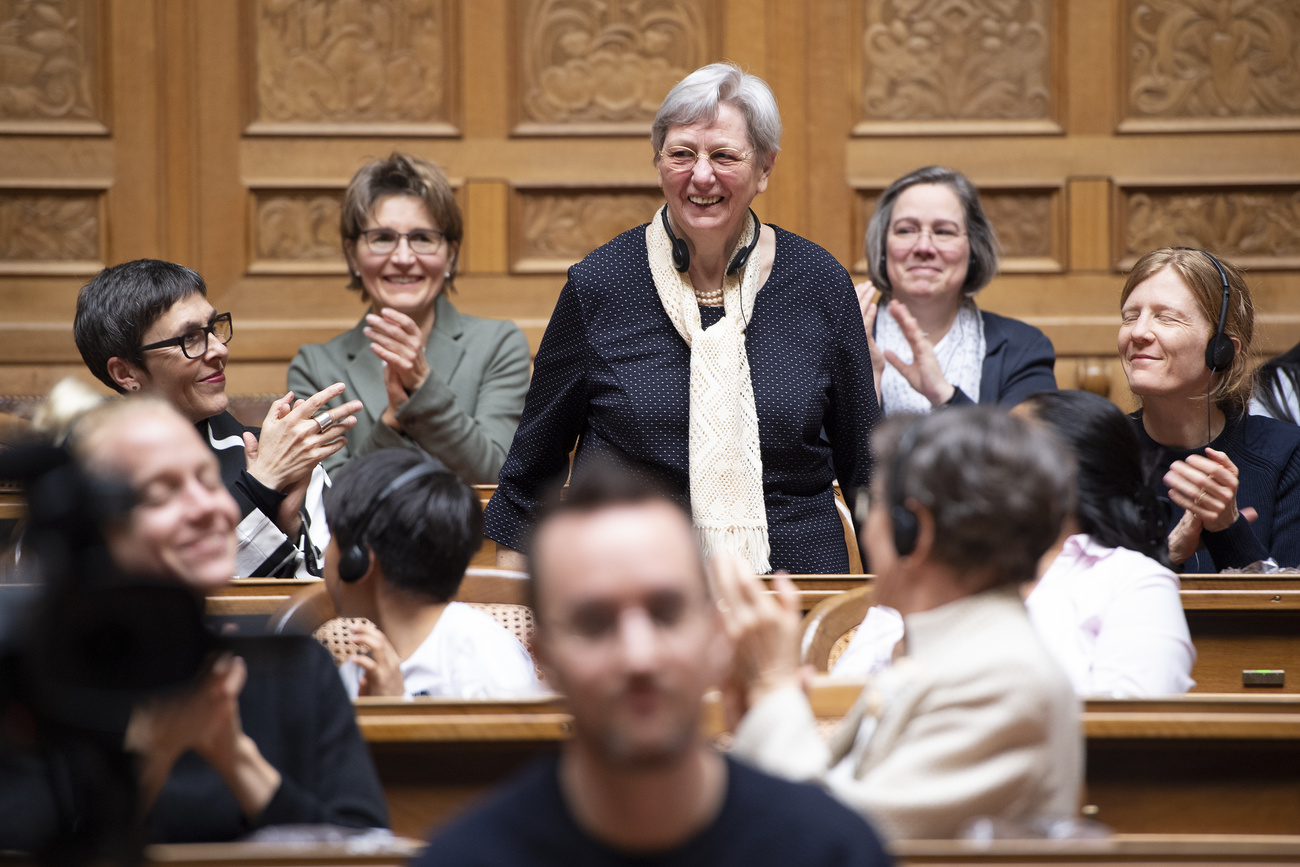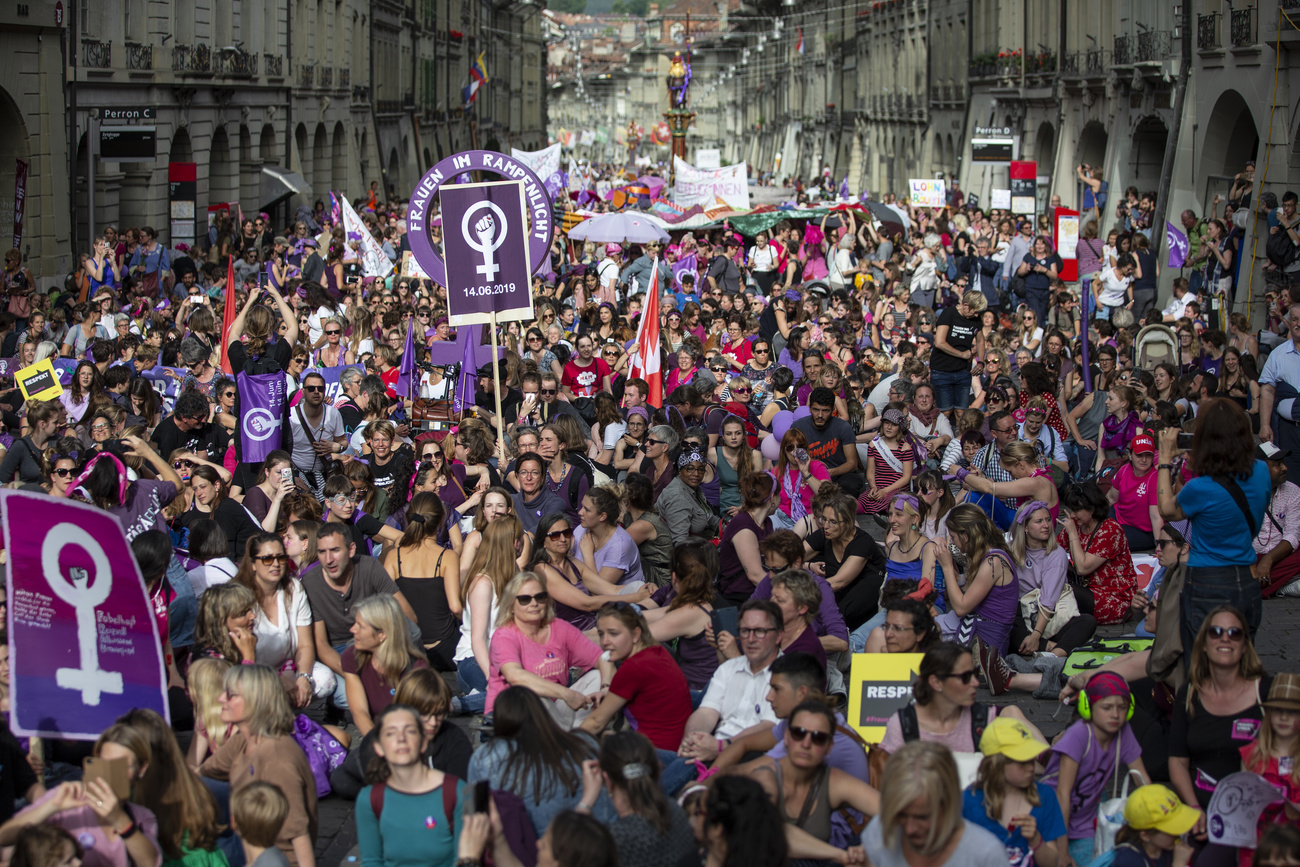
Bern, the Swiss capital of women in politics

The city, often overshadowed culturally and politically by Zurich, Geneva, and Basel, is a national and global frontrunner when it comes to women in local politics.
Last month, when the 80 members of Bern’s city parliament met for their first session of the year, there were 20 new faces among them: half were under 30, most were either left-wing or green, and almost all were women. Some 18 new female deputies were voted in on the back of an unprecedented surge in local elections last November, bringing the total number of women in the city “Stadtrat” or city parliament to 55, or 70% – a record in the country.
“It’s a truly exceptional situation,” says Martina Mousson, a political analyst from the gfs.bern polling institute. Across Switzerland, the average proportion of women in city parliaments is 32%, while in cantonal parliaments it’s 30%. Even at the national level, where a historic jump brought women in the lower house of parliament to 42% in 2019, the numbers pale in comparison.
Martin Chungong, Secretary General of the Interparliamentary Union (IPU), a Geneva body that collects data on representation worldwide, says it’s a proportion that “at the level of national parliaments, at least, has never been attained”. To date, he says, Rwanda has boasted the national parliament with the highest representation of women, at 63%. But the global average is about 25%, and progress on achieving parity in elected bodies worldwide has been “excruciatingly slow”.

More
The long road to women’s suffrage in Switzerland
The IPU doesn’t collect data at the regional and city level. But a 2018 European Parliament report suggests that in local contexts, at least in Europe, the situation is similar: 15 % of mayors and 35 % of local or regional assembly members in 2018 were women, it said.
“Women are still under-represented in decision-making and leadership positions in all spheres of life, but the situation in local and regional governments is especially bad,” the report wrote.
Left-wing legacy
How did Bern end up becoming the “Capital of feminism”, as the Bund newspaper headlined last year?
Analyst Werner Seitz wrote in the aftermath of the elections that it was down to decades of “hard work” among left-wing and centrist parties in the city. In 1992, he said, a “Red-Green-Middle” alliance of socialist, green, and centrist parties came to power in the city government. Since, the left has not only enjoyed an unbroken period of three decades in power – they have also regularly placed women in prominent positions. Already in 1993, the city government was majority female; since then, elections have seen women regularly grab over 40% of the seats.
Mousson adds that this cumulative effect is quantifiable: “returning candidates in elections have statistically better chances of re-election”, she says – which means that gains made by female candidates tend to be repeated over time.

More
‘Watch out and hold on to your rights’
Valentina Achermann, a 26-year-old newly-elected parliamentarian from the dominant left-wing social democrats – her campaign poster carried the slogan: “for social justice, always and everywhere” – reckons it’s not however only a question of left-wing politics.
Her party, which has 21 city parliamentarians, of which 16 are women, didn’t pack the election lists with gender in mind, she says – women were simply what voters wanted. Indeed, a look at the list of rejected candidates last year, across the board and on Social Democrat lists, shows that more men than women were in the running – they just weren’t elected.
Achermann also says the trend isn’t confined to the left: the seven Bern parliament members from the centre-right Radical Liberals also include only a single man.
35-year-old Simone Richner is one of these Radical Liberals. She agrees that while Bern has built an identity as a left-wing bastion, this isn’t the same as being a female bastion. Her party, with its tradition of laissez-faire liberalism, also sees the promotion of young female candidates as “extremely important”. It’s a “societal theme,” Richner says. She adds that in rural areas especially, where women are reluctant to get involved in politics, female role models are vital.

Women’s strike
Corina Liebi is another of the new faces. The 25-year-old Liberal Green says the long-term dominance of the left in the city is clearly a factor – but she also credits the large number of young people in Bern as influencing the city’s progressive politics – young people tend to “listen more to new voices”, she says.
Even more importantly, she talks about the impact of the 2019 women’s strike, which was hugely supported across the country and particularly big in Bern.
Liebi reckons the 70% city parliament result – though “surprising” in its scale – was the outcome of this action, which politicised and inspired many young women. Movements like “Helvetia Calling” – a campaign to get more women involved in national politics – were also decisive, she says.
Mousson agrees, and adds that the Bern elections were also clearly influenced by women’s organisations like Alliance F, which is “strongly networked in the city”. The results also benefitted from a “resonance effect” after the 2019 elections, she says. Studies have shown that the national elections tend to colour what happens in regional and city votes in the year or two afterwards.

More
Women in Swiss politics: still a long way to go
Beacon?
It remains to be seen if or how much will radically shift in Bern’s politics, especially as the Stadtrat is of limited importance – it approves the city budget, it names directors to some public institutions, it proposes motions, but it doesn’t necessarily hold much power.
Some people also don’t want gender to overshadow other pressing policy needs. Claudio Righetti of the “Mitte” centrist coalition, who is something of an outlier among the new deputies in that he is older, centre-right, and male, says “equal opportunities and access are obviously important”, but there are more important things. He thinks Bern has become “imprisoned” in a tug-of-war between left and right factions over the last decades. He sees his job, beyond ideology, as pushing discussions on Bern’s economic and cultural future, to break it out of its inward-directed focus.
And while the IPU’s Martin Chungong says parity in parliaments worldwide tends to lead to policies which are more “gender sensitive and gender responsive”, others have warned that focussing too much on statistics and numbers can be misleading – if women are underrepresented or discriminated in other areas of society, for example.
One concrete area mentioned by several city parliament deputies is the internal one of being able to choose a stand-in as deputy when you are sick or on maternity leave. Currently, if a member has to miss a parliament sitting – due to illness or pregnancy, for example – the voice and vote are lost. Since meetings take place outside normal working hours, this is something which can adversely affect women, say both Richner and Liebi.
As for whether Bern could be a forerunner of what’s to come in other city or regional parliaments, Mousson says it’s possible, but the exact extent is guesswork.
The general picture in Switzerland over the past decades has been one of cities moving to the left, mainly due to the influx of young, well-educated people, while rural areas remain more conservative. But the number of women in city and regional parliaments hasn’t necessarily changed as fast. Mousson says Bern could exert a “beacon effect”.
But the city could also turn out to be an outlier: the Bernese elections came at a special moment in time – after the MeToo movement, the Women’s strike, the national Green gains. Richner, the Radical Liberal politician, worries the 70% figure might be the high point of a wave. And when such extremes are reached, she says, “generally counter movements begin to take shape”.

More
Two tales of women’s suffrage

In compliance with the JTI standards
More: SWI swissinfo.ch certified by the Journalism Trust Initiative






























Join the conversation!